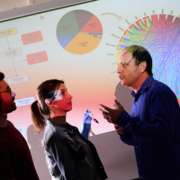Career Opportunities for Digital Health Professionals
Recognizing the growing potential of AI in healthcare, TAU now offers an MSc in Digital Health
Artificial Intelligence (AI) and digital health tools are reshaping the healthcare landscape with innovative solutions that improve patient care and operational efficiency. These advancements are creating new opportunities for professionals with expertise in digital health.
Recognizing the potential of this rapidly growing field, Tel Aviv University (TAU) is now offering a new MSc program in Digital Health. Explore the diverse career paths this program can open for you, and take the first step towards a transformative career by submitting your application.
Tel Aviv University Leading the Change
Tel Aviv University is playing a leading role in advancing digital health. Recently inaugurated Alrov Center for Digital Medicine, a collaboration between TAU and Tel Aviv Sourasky Medical Center (Ichilov), is dedicated to groundbreaking research in AI, machine learning, and big data, aimed at improving patient outcomes and transforming healthcare delivery.
One of the projects, run by the Laboratory for Early Markers of Neurodegeneration, focuses on using AI for the early-stage detection of Parkinson’s disease.
Complementing this effort, TAU’s Health Data Science Hub (HDSH) is a vital resource for researchers navigating Israel's advanced medical data landscape. By reducing barriers to access and usage of complex medical databases, the HDSH enables the integration of data from multiple sources, enhancing the potential for meaningful insights in healthcare research and practice.
Startup Nation in the Global Landscape
Israel, often referred to as the Startup Nation, is a global leader in AI initiatives within digital healthcare. The country’s robust tech ecosystem has given rise to numerous AI-driven healthcare startups, such as Zebra Medical Vision (founded in 2014 and acquired in 2021 by Nano-x Imaging), which introduced an AI solution to analyze medical imaging data, and Aidoc, which provides AI-powered solutions for radiologists to enhance diagnostic accuracy.
These initiatives have positioned Israel as a hub for innovation in digital health.
Large Israeli HMO providers actively use AI to predict which patients will likely need medical attention, enabling proactive care and reducing emergency room visits. In addition, AI algorithms help manage patient flow and optimize appointment scheduling, improving efficiency and patient satisfaction.
Revolutionizing Patient Care
AI tools are being applied across a wide range of healthcare fields, transforming both clinical and administrative aspects of the industry. Here are just a few key areas where AI is making a profound impact:
 Diagnostics
Diagnostics
For example, Google's DeepMind developed an AI system that can analyze retinal scans to detect over 50 different eye diseases with accuracy comparable to that of expert ophthalmologists. This system has been integrated into the UK's National Health Service (NHS) to assist doctors in diagnosing conditions like age-related macular degeneration and diabetic retinopathy earlier, potentially saving patients from severe vision loss.
 Personalized Medicine
Personalized Medicine
IBM’s Watson for Oncology analyzes vast amounts of patient data, including genetic information, to recommend targeted cancer treatments. At Memorial Sloan Kettering Cancer Center in the US, Watson has been used to help doctors choose the best treatment options based on the latest research and patient-specific factors, improving the precision and effectiveness of cancer care.
 Healthcare Administration
Healthcare Administration
For instance, the Mayo Clinic uses AI to predict patient no-shows, which helps optimize appointment scheduling and reduce wait times. By predicting which patients are likely to miss their appointments, the clinic can take proactive measures, such as sending reminders or offering alternative times, thereby improving efficiency and patient satisfaction.
 Telemedicine
Telemedicine
During the COVID-19 pandemic, the use of telehealth services surged, and they remain a critical component of modern healthcare. Teladoc Health, a leader in the telemedicine industry, uses AI-powered chatbots to assist patients in triaging their symptoms, scheduling appointments, and providing medical advice. These tools have made healthcare more accessible, especially during times when in-person visits were not feasible.
Become the Next Change Maker
For those looking to enter this transformative field, TAU offers a Master of Science (MSc) program in Digital Health. This program equips students with the necessary skills to navigate and lead in the digital health revolution. It covers a wide range of topics, including AI, robotics, cyber-computing, and data science, all while emphasizing ethical considerations and practical applications in real-world healthcare settings.
Embedded in a European network of universities and industry partners, the program offers unparalleled opportunities for collaborative research, internships, and job placements.
If you are passionate about the intersection of technology and healthcare, and want to be at the forefront of this digital revolution, apply for TAU’s MSc in Digital Health led by Dr Tal Soffer and Prof Noam Shomron. Applications are open now, and the deadline is approaching soon. Don’t miss the opportunity to be part of this exciting new field.
Interested in learning more about the new MSc in Digital Health, including application requirements?
Visit our program page to learn more and apply.





